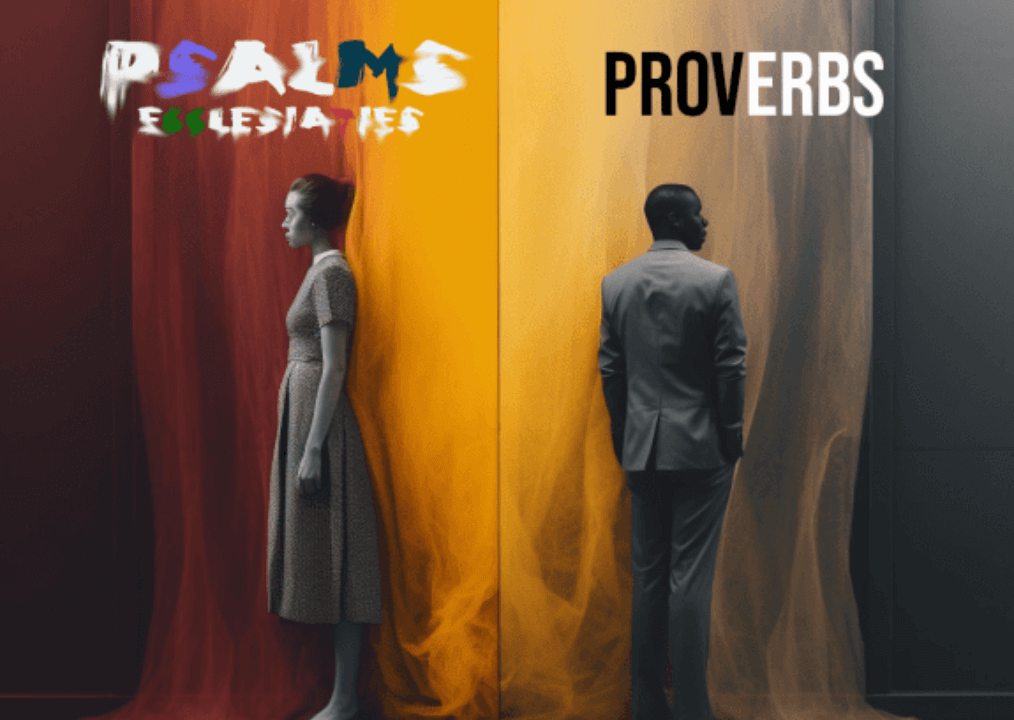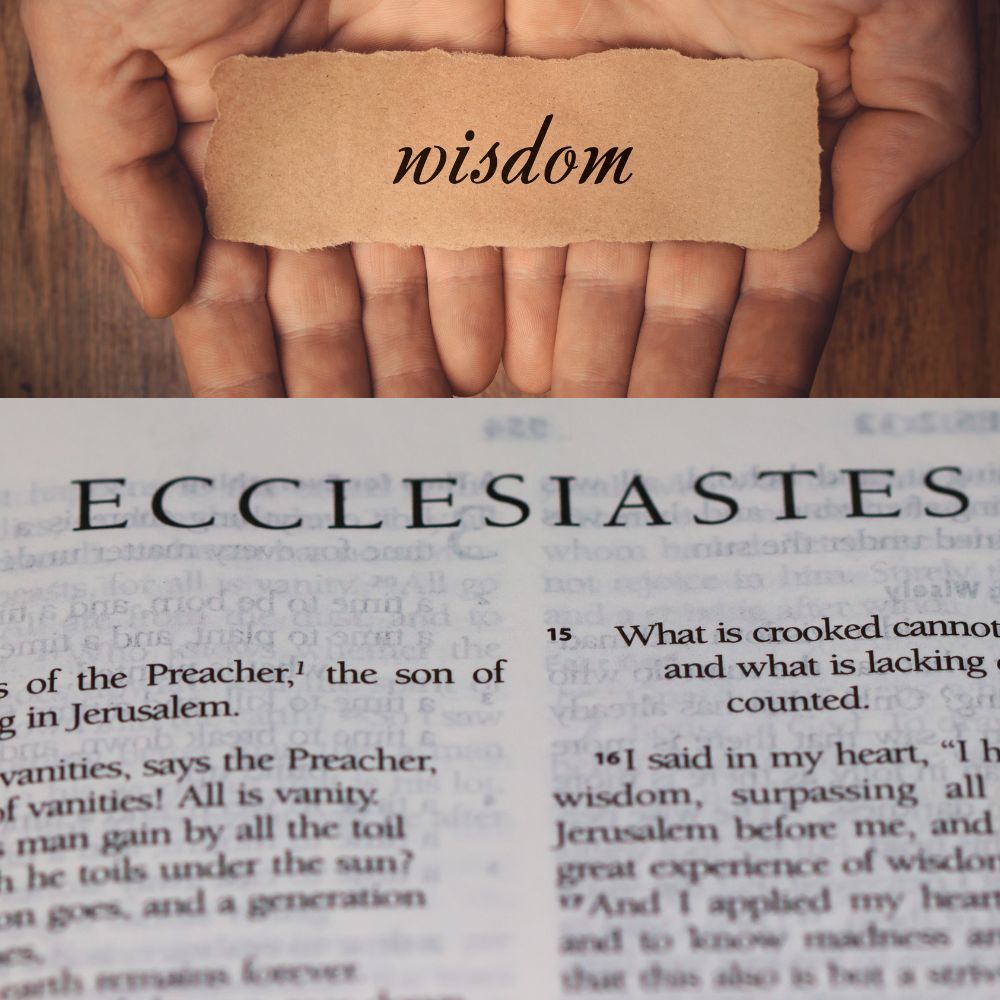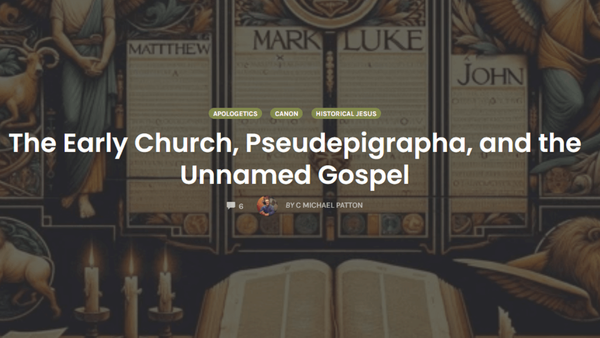(Editor's Note: We are pleased to have C. Michael Patton join our blog again today in an article as he discusses a unique connection he discovered between these three books in our Bible: Psalms, Ecclesiastes, and Proverbs.)
Introduction:
Embarking on a Bible reading plan can often lead to unexpected discoveries and profound insights. As I found myself immersed in the Psalms and Proverbs during my “Through the Bible in a Year” program, I began to notice a unique connection between these two books of wisdom I had not seen before. While I have yet to delve into the book of Ecclesiastes, knowing what I know about it, I believe that Ecclesiastes, just as much as the Psalms, fit into this pattern.

Wisdom Unveiled:
The Proverbs, with their pithy and insightful statements, provide glimpses into the underlying truths and ultimate reality of life. Although each individual proverb may not always hold true in every situation, collectively, they shed light on the hidden workings of the world. As are all proverbs, they are general truths that don’t necessarily work out in every situation. A good thing to remember is that proverbs are not promises.
The Psalms, on the other hand, serve as a reflection upon this wisdom. I don’t mean to be reductive. There are various types of Psalms (basically Psalms of praise and Psalms of confusion). My focus is just on those that express doubt and bewilderment.


Wisdom Contradicted?
While many of the Psalms predate the Proverbs, it is presumed that the psalmists possessed a similar type of wisdom as Solomon did when he penned the Proverbs. In fact, many of the Psalms are proverbs themselves. David, of course, wrote most of the Psalms. Though he was not as wise as Solomon, he was no fool. In the Psalms, again, especially in the more melancholic ones, we witness him grappling with his understanding of wisdom, in light of his current circumstance. He longed for the righteous to prosper and the wicked to fail. The proverbs he knew did not seem to square with the real world. Here is a comparison:
Proverbs 13:21 – “Misfortune pursues the sinner, but prosperity is the reward of the righteous.”
Psalm 73:12-14 – “This is what the wicked are like— always free of care, they go on amassing wealth. 13 Surely in vain I have kept my heart pure and have washed my hands in innocence. 14 All day long I have been afflicted, and every morning brings new punishments.”
Though this is not a Psalm of David, it is illustrative of many others, too numerous to count. Just look how different they are. An unbeliever would cry, “Contradiction”! But this evaluation would be a simple misunderstanding of the purpose of each book. One is to give objective wisdom (Proverbs) while the other is how subjective experience often has a head-on collision with objective wisdom (Psalms). One gives direction the other empathy.
Confusion and a Mourning:
Within the Psalms, we encounter a perplexing mix of emotions, an amalgamation of confusion and mourning. The Psalmists call upon God, eagerly anticipating His ultimate victory, which they believe will bring resolution to the present predicament and restore the expected order of the world.
Psalm 73:17-18 (KJV) – “17 Until I went into the sanctuary of God; then understood I their end. 18 Surely thou didst set them in slippery places: thou castedst them down into destruction.”
As inhabitants of the same fallen world as the Psalmists, we share in their quest for understanding. We find solace in the eternal truths embedded in the Proverbs, yet our experiences often leave us bewildered, questioning God’s sovereignty. Sin, in its devastating impact, has the power to disrupt even the most firmly established Proverbs, leaving us feeling disoriented.

Enter Ecclesiastes:
And then there is the book of Ecclesiastes. In many ways, Ecclesiastes is the melancholic Psalms of a broken man, with a touch of proverbial wisdom lingering at the end. Ecclesiastes explores the complexities of life, delving into the futility and vanity of human endeavors. Yet, amidst the bleakness, a thread of hope emerges, reminding us of the significance of finding purpose in our work and enjoying the gifts bestowed upon us by God.
Here is Solomon's conclusion:
Ecclesiastes 12:13-14 “Now all has been heard; here is the conclusion of the matter: Fear God and keep his commandments, for this is the duty of all mankind. For God will bring every deed into judgment, including every hidden thing, whether it is good or evil.”
Conclusion:
These are just some opening thoughts from this morning’s study. They are more realistic than proverbial right now!
But as we navigate through life, encountering the timeless wisdom of Psalms, Proverbs, and Ecclesiastes, we find ourselves on a journey of understanding. Like the Psalmists, we grapple with the paradoxes and mysteries of a fallen world. We draw strength from the truths revealed in the Proverbs, even as we confront the dissonance caused by sin. And in Ecclesiastes, we find a poignant reminder that, despite the complexities and fleeting nature of life, our ultimate purpose lies in working diligently and embracing the joys that God has graciously provided.
May this exploration deepen your appreciation for wisdom, offer solace in times of confusion, and inspire us to seek a meaningful existence in the midst of what often feels like a meaningless life.
You Might Also Like
Top Ten Biblical Discoveries in Archaeology - #2 House of David Inscription
This post is a continuation of our Top Ten Biblical Discoveries in Archaeology series. To see the complete series please click the title above. The Great Kings of Israel Without question the two greatest kings of Israel were David and Solomon. The Bible is full of rich stories recounting these two remarkable…
2010-09-29
The Great Trinity Debate, Part 4: Dave Burke on the Holy Spirit
The Need for Contextual Exegesis A notable feature of this debate has been the contrast between the exegetical methodologies of both sides. Rob favours an approach that places great stress on the NT texts and interprets these in a Hellenistic way that frequently steps outside the first-century milieu, whereas I…
2010-05-04
(Lisa Robinson) It is quite common today to hear Christians say that God spoke to them or that they are seeking to hear God's voice for some type of guidance. No longer under the purview of Charismatic circles, this concept has seeped into the fabric of mainstream evangelicalism. Therefore, to…
2012-11-17

C. Michael Patton is the primary contributor to the Parchment and Pen/Credo House Blog. He has been in ministry for nearly twenty years as a pastor, author, speaker, and blogger. Th.M. Dallas Theological Seminary (2001), president of Credo House Ministries and Credo Courses, author of Now that I'm a Christian (Crossway, 2014) Increase My Faith (Credo House, 2011), and The Theology Program (Reclaiming the Mind Ministries, 2001-2006), host of Theology Unplugged, and primary blogger here at Parchment and Pen. But, most importantly, husband to a beautiful wife and father to four awesome children. Michael is available for speaking engagements. Find him everywhere: Find him everywhere.
Thank you for visiting our Christian blog, and we look forward to sharing our passion for Christian theology and literature with you!









Member discussion